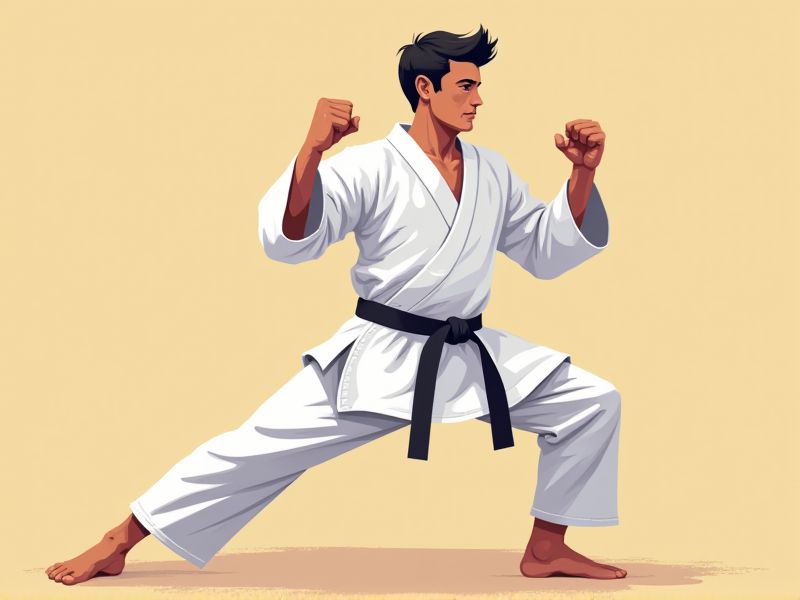
To improve at karate, one must focus on character development and technique. Gichin Funakoshi, a renowned karate master, emphasized that "spirit first, technique second" is crucial for true mastery. This approach highlights the importance of mental discipline and inner strength over mere technical proficiency. By prioritizing spirit and character, karate practitioners can cultivate a deeper understanding of the art and enhance their overall performance. Additionally, Funakoshi noted that "the ultimate aim of Karate lies not in victory or defeat but in the perfection of the character of its participants".
How to Be Better at Karate
Consistent Practice
Consistent practice in karate reinforces muscle memory, enabling precise execution of techniques and forms. Routine training cultivates mental focus and discipline, both crucial for executing complex movements under pressure. Frequent repetition allows for the quick identification and correction of errors, leading to steady improvement over time. Establishing a regular practice schedule not only solidifies foundational skills but also builds the resilience needed to advance in martial arts.
Technique Refinement
Start by analyzing your current techniques through video review and detailed feedback from your sensei, ensuring measurable improvements over time. Incorporate repetitive drills that break down each move into fundamental components while focusing on balance, precision, and controlled power. Utilize targeted exercises that strengthen core muscles and improve flexibility, which are vital for executing refined karate techniques. Regularly engage in sparring sessions under varied conditions to test and adapt your refined techniques, ensuring they translate effectively into real combat situations.
Physical Conditioning
Integrating structured cardiovascular workouts increases endurance, allowing your body to recover faster between training rounds and competitions. Building strength through resistance exercises improves the power behind your strikes and stances, which directly contributes to more effective techniques. Adding flexibility and balance sessions minimizes injury risks by keeping muscles pliable and joints aligned under stress. Regular, varied physical conditioning creates a feedback loop that enhances overall performance, meaning each training session builds on the last for continuous improvement in your karate skills.
Mental Discipline
Focus on mental discipline by integrating consistent mindfulness practices into your training. This focus sharpens your concentration, allowing you to better absorb intricate techniques and correct mistakes in real time. Regular meditation sessions enhance your ability to stay calm under pressure, leading to improved reaction times during sparring. Ultimately, the mental clarity you build through discipline translates to more precise movements and a deeper understanding of the art, reinforcing your overall performance in karate.
Flexibility Training
Incorporating daily stretching routines, particularly dynamic stretches before training and static stretches afterward, can significantly improve flexibility and enhance your karate performance. Regular flexibility exercises, including yoga poses and targeted stretching, have been shown to increase range of motion and reduce injury risks. Gradually increasing stretch duration and intensity over time promotes muscle elasticity and agility, allowing for smoother execution of complex moves. Data indicates that even a 10-15 minute focused flexibility session on most training days can lead to measurable improvements in speed, balance, and overall performance in karate.
Kata Mastery
Consistent practice in breaking down and refining each movement within the kata can improve muscle memory and overall performance. Analyzing each sequence through video recordings allows you to objectively identify areas that need adjustment, leading to faster technical improvements. Incorporating feedback from seasoned instructors facilitates corrective measures that directly enhance precision and stability. Structured physical conditioning, when combined with disciplined kata rehearsal, notably increases your execution speed and strength.
Effective Sparring
Effective sparring in karate simulates real combat conditions, allowing you to hone reflexes and adapt your techniques under pressure. Regularly engaging in varied sparring sessions exposes you to diverse fighting styles and speeds up your ability to read opponents. This practice reveals technical weaknesses and provides immediate feedback, which in turn accelerates your skill refinement and tactical understanding. Consistently applying insights gained from sparring leads to enhanced conditioning, sharper decision-making, and overall better performance in the dojo.
Instructor Feedback
Instructor feedback consistently emphasizes the importance of refining your technique through deliberate practice and attention to detail. Listening carefully to corrections and immediately applying those insights helps build a robust foundation in form and balance. Regular self-assessment, such as recording and reviewing your movements, aligns your progress with instructor guidance and validates improvements. Structured training routines that incorporate strength, flexibility, and endurance exercises significantly boost performance and proficiency in karate.
Proper Nutrition
Balanced and nutrient-rich meals provide the energy needed to sustain rigorous karate training sessions. Including lean proteins, complex carbohydrates, and healthy fats aids in muscle recovery and repair after intense physical exertion. Consuming ample fruits and vegetables supplies antioxidants and vital micronutrients that help reduce inflammation and improve overall performance. Staying well-hydrated and timing nutrient intake around training sessions further enhances endurance and sharpens technique.
Goal Setting and Reflection
Establish specific, measurable goals for each training session--whether it's perfecting a strike or improving your balance--and track your progress with consistent data points. Use the SMART criteria to break your overarching karate ambitions into achievable, time-bound milestones that keep you motivated and focused. After each session, reflect on both your successes and areas needing improvement by reviewing training logs and considering direct feedback from instructors. This data-driven approach to goal setting and reflection ensures continuous improvement by aligning your techniques with clear performance metrics and informed adjustments.
Summary
Consistent practice builds the foundation of your karate skills by reinforcing muscle memory and increasing confidence. Refining your technique ensures that every movement is executed efficiently and minimizes the risk of injury. Physical conditioning enhances strength, flexibility, and endurance, which in turn supports better performance during training and competitions. Combining these focused approaches creates a robust framework that leads to overall improvement in karate proficiency.
